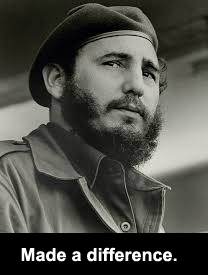For the ages.
Perhaps the most predictable response to the death of Fidel Castro was the corporate media's nearly exclusive focus on his critics' jubilation. I can't tell you how many times I've heard audio of car horns honking in Miami over the past week. Contrary to the impression viewers and listeners might get from this coverage, the exile community's joy was a small island in a sea of regrets pouring in from nearly the entire world, particularly those corners of it that benefited directly from Cuban assistance over the past 55 years. As was becoming the case with regard to our relationship with the OAS, our reaction to Castro's death isolated us from the rest of the hemisphere and, indeed, the globe.
 This cannot be overstated: South Africa and some of its immediate neighbors (Namibia, Angola) would not be the nations they are today without Cuba's intervention on their behalf in the fight against the racist Apartheid military and its allies. Whatever criticisms anyone may have about Castro's rule and his repression of internal dissent, we have to acknowledge that the Cubans have engaged in humanitarian intervention to a degree that far surpasses anything we have done. They did so at great cost: Washington really turned the screws on Havana, making them pay dearly for their activist stance in support of independence movements overseas.
This cannot be overstated: South Africa and some of its immediate neighbors (Namibia, Angola) would not be the nations they are today without Cuba's intervention on their behalf in the fight against the racist Apartheid military and its allies. Whatever criticisms anyone may have about Castro's rule and his repression of internal dissent, we have to acknowledge that the Cubans have engaged in humanitarian intervention to a degree that far surpasses anything we have done. They did so at great cost: Washington really turned the screws on Havana, making them pay dearly for their activist stance in support of independence movements overseas.
To be clear, our attack on Cuba was never about human rights. We maintain full diplomatic relations with states that have abysmal human rights records, with no problem whatsoever. (China, Saudi Arabia, and Bahrain come to mind.) In any case, it's important to remember that when Castro's revolution came to the island, Cuba was not facing a choice between socialism and Jeffersonian democracy. The other option was what Honduras, Guatemala, El Salvador, and Haiti saw under the imperial imprimatur of the United States: slaughter in the hundreds of thousands, an all out war on the poor and the church, and a degradation of society that reverberates to this day. And the notion that Cuba was a "terrorist" state is laughable: we carried out terror attacks on the island for decades, making many attempts at assassinating Castro himself, supporting terror bombers like CIA asset Luis Posada Carriles, who blew up an airliner carrying the Cuban Olympic fencing team, as well as Orlando Bosch.
So, Fidel Castro is for the ages, but the legacy of our imperialism is still alive and well.
 This cannot be overstated: South Africa and some of its immediate neighbors (Namibia, Angola) would not be the nations they are today without Cuba's intervention on their behalf in the fight against the racist Apartheid military and its allies. Whatever criticisms anyone may have about Castro's rule and his repression of internal dissent, we have to acknowledge that the Cubans have engaged in humanitarian intervention to a degree that far surpasses anything we have done. They did so at great cost: Washington really turned the screws on Havana, making them pay dearly for their activist stance in support of independence movements overseas.
This cannot be overstated: South Africa and some of its immediate neighbors (Namibia, Angola) would not be the nations they are today without Cuba's intervention on their behalf in the fight against the racist Apartheid military and its allies. Whatever criticisms anyone may have about Castro's rule and his repression of internal dissent, we have to acknowledge that the Cubans have engaged in humanitarian intervention to a degree that far surpasses anything we have done. They did so at great cost: Washington really turned the screws on Havana, making them pay dearly for their activist stance in support of independence movements overseas.
To be clear, our attack on Cuba was never about human rights. We maintain full diplomatic relations with states that have abysmal human rights records, with no problem whatsoever. (China, Saudi Arabia, and Bahrain come to mind.) In any case, it's important to remember that when Castro's revolution came to the island, Cuba was not facing a choice between socialism and Jeffersonian democracy. The other option was what Honduras, Guatemala, El Salvador, and Haiti saw under the imperial imprimatur of the United States: slaughter in the hundreds of thousands, an all out war on the poor and the church, and a degradation of society that reverberates to this day. And the notion that Cuba was a "terrorist" state is laughable: we carried out terror attacks on the island for decades, making many attempts at assassinating Castro himself, supporting terror bombers like CIA asset Luis Posada Carriles, who blew up an airliner carrying the Cuban Olympic fencing team, as well as Orlando Bosch.
So, Fidel Castro is for the ages, but the legacy of our imperialism is still alive and well.
Comments